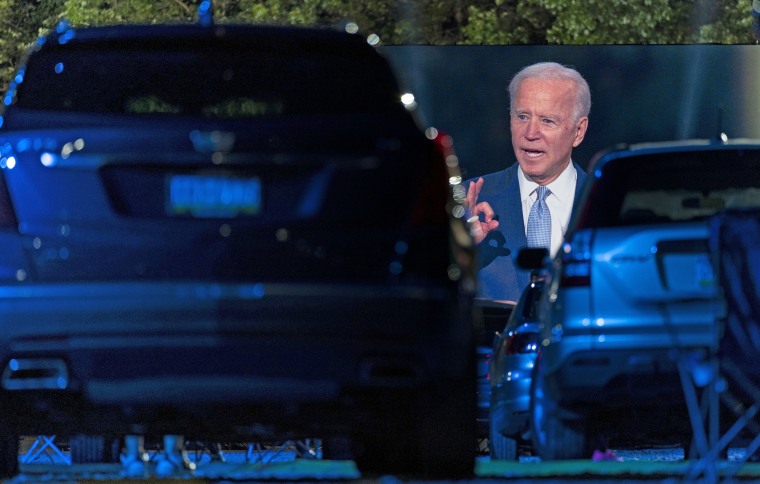WASHINGTON — "Scranton" Joe Biden versus "Park Avenue" Donald Trump is the Democratic nominee's frame in the final stretch of a chaotic presidential campaign as early voting begins.
In campaign speeches, in interviews and on social media, Biden is increasingly evoking an age-old narrative pitting regular Americans against wealthy elites in the hope of connecting with economically anxious voters in battleground states.
And Trump, a former real estate developer from New York who inherited millions from his father, is his foil.
"I've dealt with guys like Donald Trump my whole life, who would look down on us because we didn't have a lot of money or your parents didn't go to college," Biden said Monday in a campaign speech in Manitowoc, Wisconsin, a city of 33,000 people north of Milwaukee. "Guys who think they're better than you. Guys who inherit everything they've ever gotten in their life and squander it."
Biden's message is an attempt to counter Trump's nativist populism, which blames immigration and globalization for middle-class struggles and proved successful at winning voters in industrial Midwestern states like Wisconsin and Michigan. Former rival-turned-supporter Bernie Sanders had fretted that Biden wasn't doing enough to appeal to those key voters.
Biden is seeking to recapture those historically Democratic states with a counternarrative that says the wealthy and the powerful look down on the working class and have exploited it economically by refusing to pay taxes that help create opportunity.
At a town hall in Moosic, Pennsylvania, hosted by CNN, Biden framed the race last week as "a campaign between Scranton and Park Avenue."
"We are as good as anybody else," Biden said. "And guys like Trump, who inherited everything and squandered what they inherited, are the people that I've always had a problem with."
The Trump campaign scoffed at Biden's message.
"Joe Biden may pretend to be 'one of the people' but his radical proposals to increase taxes by $4 trillion and kill millions of energy jobs highlight who he really is, an out of touch career politician," Trump spokeswoman Courtney Parella said in an email. "Through tax cuts, deregulation, and better trade deals, President Trump led our nation into economic prosperity once and voters in hard working communities like Scranton know he is the only leader who can deliver the Great American Comeback."
As the coronavirus batters an already struggling middle class, the economy looms large over Trump's hopes of winning four more years in office. It's a rare policy topic that voters trust Trump over Biden to handle, which has made some Democrats nervous. Overall, national and battleground polls show Biden as the favorite to win the election.
The two men are headed to a clash at the first presidential debate Tuesday in Ohio, hosted by Chris Wallace of Fox News, who has announced that the economy will be one of six topics.
'Authentic to who Joe Biden is'
With Trump deeply distrusted on handling the coronavirus and health care, Biden advisers see the economy as the last remaining pillar propping up the president, and they are hoping their economic populist pitch will neutralize that advantage.
Where Trump seeks to slash taxes and eliminate rules for businesses, Biden has called for tax increases on corporations and individuals who earn more than $400,000 to fund an expansion of health care coverage, clean energy infrastructure and more as he proposes to "Build Back Better."
Former advisers to President Barack Obama said the strategy mirrors Obama's successful pitch in 2012 to portray Republican opponent Mitt Romney as a super-rich corporate predator who looked down on regular Americans.
"It was critical," Stephanie Cutter, Obama's deputy campaign manager that year, said of the former president's economic message. "In 2012, it was the linchpin to the race."
Cutter said Biden's pitch is "authentic to who Joe Biden is" as "the man who grew up in blue-collar America" and seeks to revitalize those communities. "Donald Trump ran as the billionaire who would take care of working America. And he hasn't done that," she said.
Trump's approval rating on the economy has narrowed from 17 points in February, before the coronavirus pandemic began to claim American lives, to 3.5 points in the RealClearPolitics average.
Still, Trump leads Biden by 48 percent to 38 percent in a recent NBC News/Wall Street Journal poll when voters were asked whom they trust more to deal with the economy. That margin has been steady since April, during the early stages of the shutdowns.
Biden has sought to connect the economy's inability to fully reopen to Trump's "failed response" and his admission that he tried to downplay the severity of the coronavirus. The president has continued to embrace rosy or unscientific forecasts, last week defending his claim that the virus will "disappear."
Jack Kingston, a Trump surrogate and former member of Congress from Georgia, compared the president's optimism about the virus to British Prime Minister Winston Churchill's resolve to defeat Adolf Hitler.
"Can you imagine, in World War II, if Roosevelt or Churchill had been saying, 'It looks bad there, I don't know if we're going to do it,' would we have won the war?" he asked. "Part of what Trump is doing is — you've got to have the cheerleader out there."
Trump himself has taken note of Biden's message.
At a rally Tuesday in Pittsburgh, he claimed that Biden "copied my campaign" when Biden rolled out a "Buy American" manufacturing platform.
And the president reiterated his anti-immigration pitch.
"During the pandemic, I've suspended the entry of foreign workers who threatened American jobs. As our economy reopens, I want to ensure that Americans are first in line to get the great jobs," he said.

